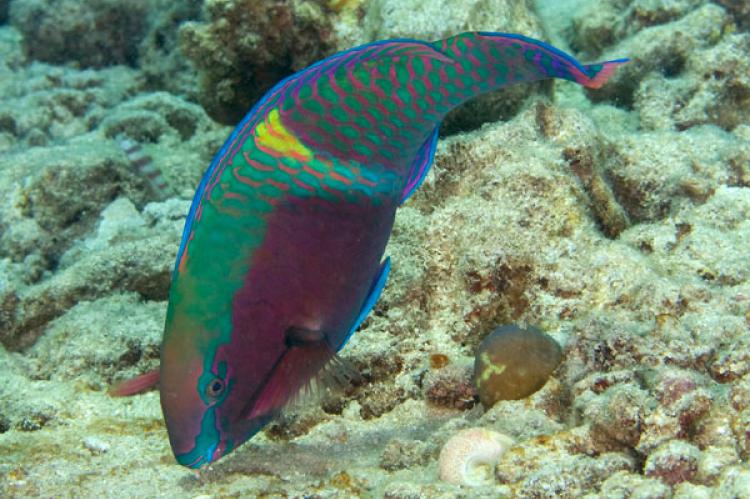Parrotfish, important reef gardeners
Australian scientists have urged greater consideration for the brilliantly-hued parrot fishes that tend and renew the world’s imperilled coral reefs. Scientists says the activity of these small parrotfishes (and other reef cleaners) are the possibly the main explanation why many coral reefs around the world subject to heavy human pressures have not yet collapsed.
“Parrotfishes are the constant gardeners of the reef. They play a crucial role in keeping it healthy, suppressing weed, removing sediment and helping the corals to regrow after a setback,” explains Professor David Bellwood of the ARC Centre of Excellence for Coral Reef Studies and James Cook University.
In a major new study published in the Proceedings of the Royal Society, Prof. Bellwood, Dr Andrew Hoey and Prof. Terry Hughes have investigated parrot fish populations on 18 coral island reefs extending from Mauritius in the west Indian Ocean to Tahiti in the central Pacific.
Parrot fish fulfill a number of key roles on the reef. They remove sick and dead corals and clean areas for new corals to settle, they remove weedy growth, and they cart away literally tons of sand and sediment that would otherwise smother the corals.
“But there are two sorts of parrot fish - the large ones which perform the main garbage removal task for the reef, and the much smaller once which scrape away at the reef and keep it clean, healthy and free of weed. Both are being targeted by fishers, but the smaller parrotfish appear better able to withstand the pressure.”
“These smaller fish are incredibly tough and this is good news, because it means they are in a sense buying us time to get the management of coral reefs right, as the world sorts out how it is going to cut its carbon emissions and reduce other pressures on reefs.”
Resilience
While the smaller parrotfish are indeed resilient, it is nevertheless vital not to overfish them because of the role they perform in helping reefs regenerate, he cautions. Larger parrotfish have already suffered extensively from heavy targeting by spear fishers.
“Our analyses found that the most heavily-fished reefs have lost virtually all of their large parrotfishes, with individuals larger than 25 cm accounting for just 3–6% of the remaining
stocks on the five most heavily fished reefs,” the team says in their report.


